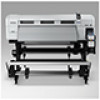Epson SureColor F7170 User Manual - Page 24
Notes When Not Using the Printer
 |
View all Epson SureColor F7170 manuals
Add to My Manuals
Save this manual to your list of manuals |
Page 24 highlights
❏ We recommend performing maintenance on the following components as required. Failure to perform appropriate maintenance will shorten print head life. See "Maintenance Around the Print Head" on page 88. Component to be cleaned Print head Wiper Caps Wiper rail Frequency When colors in the printout are faint or missing even after head has been cleaned. When the printout is smudged or not clear. Component requiring replacement Wiper cleaner Wiper Frequency If the printout is faint or smudged, or segments are missing even after cleaning ❏ The print head may not be capped (the print head may not return to the right side) if the printer is turned off when the media is jammed or an error has occurred. Capping is a function for automatically covering the print head with a cap (lid) to prevent the print head from drying out. In this case, turn on the power and wait until capping is performed automatically. ❏ When the power is on, do not remove the power plug or cut the power at the breaker. The print head may not be capped properly. In this case, turn on the power and wait until capping is performed automatically. ❏ The print head is automatically cleaned at a fixed interval after printing to keep the nozzles from clogging. Be sure that the waste ink bottle is installed whenever the printer is on. ❏ As well as being expended during printing, ink is used during head cleaning and other maintenance required to keep the print head in working order. Notes When Not Using the Printer If you are not using it, note the following points when storing the printer. If it is not stored correctly, you may not be able to print properly the next time it is used. ❏ If you do not print for a long time, the print head nozzles may become clogged. Turn the printer on at least once a week to prevent the print head clogging. Introduction 24















